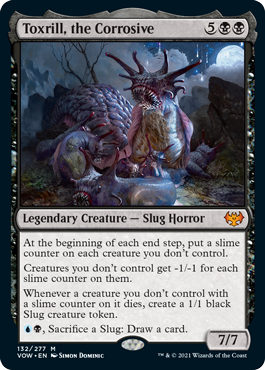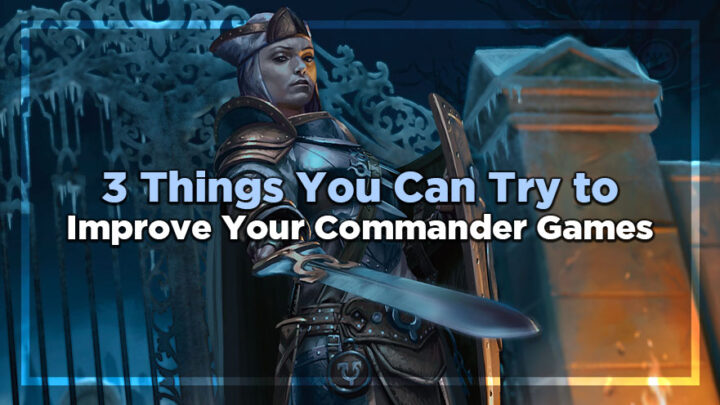Kristen shares a few ideas that could improve your Commander games.
Commander is one of the broadest and most diverse formats of any game on the planet, let alone Magic. With that diversity of playstyle comes diversity of approach, and what works for you might not work for others outside your playgroup. Today, I’ll share a few ideas I’ve been ruminating on that might help you cultivate a better playgroup and a better experience.
Play Against Anything Once
So, this one is huge right now, and you need to hear it. Play against anything once.
At a time where self-determination is at its highest in the community – with players cemented into ideas of what they like and don’t like, and what they expect out of a game – it might seem a little gauche to say “just play against it once.” That requires time, effort, and maybe even sacrificing one of your scant few slots to play Commander every week to an experience that might well be miserable.
But honestly? People have gotten so wrapped up in defining their own experience that they have forgotten that this is a social format, and that everyone has different ideas of what constitutes an oppressive card or strategy, and even what makes a card powerful. I touched on this idea recently when I said that graveyards are far from sacred. What makes Magic such a good game is that it’s interactive. It’s not two (or four) people playing solitaire – it’s a game with deep, interesting gameplay that rewards being tactical. In the same way that playing interaction or hate pieces can feel rewarding, so too can playing against them. It’s way more fun to assemble your win condition after a tough journey than it is to just drop a couple of cards and clean up – and that’s for all players involved, too.

Rather than sitting down opposite a Sarulf or Liesa deck and deciding that you’re better off switching to a deck with a better “match-up,” consider that you’re essentially metagaming the pod before you even shuffle up. You can’t win every game, and in the same way that pre-boarding interaction and removal better suited to a match-up is disingenuous, trying to hedge against a possible loss is just as problematic. If players truly are happy with winning 25% of the time, then they should be fine sitting down at a table that’s rough going.
I played a game recently where I chose to sit down with Cosima, God of the Voyage. My list is light on creatures, has no lifelink, and has a fairly late-game sea-monster theme with a clunky four-card combo that involves untapping with Walking Atlas. My opponents were Borborygmos Enraged, Grumgully Goblin tribal, and another fast-damage deck that was either low to the ground or playing Purphoros, God of the Forge. On paper, this is a truly awful match-up for me. My few creatures would be prime targets for the plentiful removal, and my life total would be dropping like nobody’s business.
The game was pretty rough going, but thanks to some clever table politics, Dulcet Sirens, Aetherize, and a Marit Lage’s Slumber into a clone, I was actually able to cinch the win at a single digit life total. And you know what? It felt amazing, and it felt so good because I had to work for it.

Am I saying that it’s black and white, and that Magic players shouldn’t air concerns in a healthy Rule 0 conversation? Not at all. This approach won’t work all of the time, and one of the hallmark cards that seems to prompt this discourse right now is Toxrill, the Corrosive. Toxrill invalidates some strategies completely if built properly – with clones and fast mana – and I am fully aware and even complicit in saying that the card gives me the heebie-jeebies.
However, I have not said no to playing against it yet. I played against it recently on my good friend AdamtheGatherin’s stream, and thought it took the pod cooperating to keep it under control, we did manage it.
When it comes to commanders that are polarizing like this one, it’s best for two things to happen to ensure a good game of Commander:
- The other players need to keep open minded, trust that the player isn’t being maliciously evasive with describing their deck’s intention and power level, and learn empirically whether they should fear the deck.
- The player with a potentially powerful deck or strategy needs to be okay with the fact that a game might end up in an archenemy situation more often if they play that deck, and they shouldn’t whine about being ganged up on (provided their opponents are using reasonable force to keep them pruned).
I played against my friend Oka’s Sarulf deck the other week, and it wasn’t as powerful as people let on. It did some cool stuff, but ultimately the clock was a slow one. Liesa, Forgotten Archangel has people hands-in-the-air fretting about their graveyards, and in the games I’ve had with her so far, she has removed fewer cards than other incidental graveyard hate people are running, and she’s not difficult to remove (and expensive to recast).
The sky is falling less often than you’d think. Trust the old saying: “Fool me once, shame on you. Fool me twice, shame on me.” Play that game. Test how the deck feels to play against. Gather some evidence before putting your walls up. And just be conscious that the way you express your needs and desires for a Commander game doesn’t stray into bullying. At the end of the day, your goldilocks zone is exactly that. You can’t always get perfect porridge.
For some more tips about evaluating how to play against controlling decks, check out this piece I did recently: Racing the Invisible Clock Against Control in EDH.
Winner Stays On
So, here’s a curveball, and it’s something that I think most people actually do the opposite of. When a player wins a game in a Commander pod, what usually happens? Well, most of the time, the winning player swaps off of their deck. Maybe they’ll opt for something with a different velocity, or a different strategy altogether. The other players in the pod might stick to the same decks to get another run in with them, but they might also decide to swap out.
I’d like to suggest that, if you want to evolve your playgroup’s understanding of power levels and what players like to play, and cultivate a healthy and easy-to-gauge environment, it’s actually counterproductive for the winning player to switch out their deck.
In order for the pod to collectively understand what power levels are within their local metagame, it’s better for the winner to stay on. The other players should then, in the post-game chat, discuss what they thought about the game. Did the player get lucky and punch up? Did they get a fair win that should be balanced out by playing more games? Or did it feel like they steamrolled the pod?
Armed with this knowledge, the other players can then switch their decks – or keep them the same – to have a rematch. Now, this rematch might result in the previous winning deck getting steamrolled, but if we’re happy with a 25% win rate – and we trust our friends not to pubstomp us on purpose – this is super productive for calibrating an understanding of power level between friends.
By playing it back with decks that may be more in-tune, you can glean a greater understanding of how each of you interpret power. While the game has the chance to leave you in a similar position – with more calibration needed – you’ll still end up closer to the goldilocks zone. It’s like a game of Battleship; with practice, you’ll strike red.
This isn’t an approach every pod will have time for, especially when playing with strangers or creating content with contemporaries. What it is useful for, however, is cultivating a regular playgroup, and helping you evaluate new decks that are born into your local metagame. Just be sure to have a great post-game chat after the second game – these kinds of conversations are just as important as Rule 0 pre-game talks, in my opinion.
Last Player In Turn Order Picks Deck Last
Many great minds have worked out what can be done about the disadvantage of playing last in the turn order in Commander. Unless you manage to drop a turn 1 Sol Ring, it can feel like a real struggle (especially if you stumble) when going last.
I talked recently about how sorceries were adapting to their inherent disadvantage by including cost reduction as part of their design mechanics. This can offset the tempo loss of having to “take the turn off” to deal with all of the nonsense accumulating on the board. This tempo less is felt no more keenly than when you’re last in the turn order, and so it can often feel prohibitive to be table-cop when going last, too. You end up in a position where you’re playing catch up but can’t remove things concurrently.
Though deciding on a way to ameliorate going last is very, very difficult, owing to the inherent advantage starting the game with extra resources might be, there’s one that might be worth a go.
Once you’ve had your Rule 0 discussion about what kind of game you all want, how about rolling to decide turn order before decks are finalized? Once you figure out the turn order, let the player going last pick their deck.
While, on the surface, this is ripe for abuse – particularly in an unfamiliar pod where pubstomping hasn’t been ruled out – in a group of trusting friends, it can help the player going last avoid feeling like they’re being punished even harder.
Consider a situation in which one player at the table has picked a commander without card draw or ramp in the command zone, and the other players all have. Now, my advice in that situation is generally to swap decks, anyway. Power level and intent aren’t the only predicating factors for a good game – so is consistency. Well, imagine that player is now going last in the pod. Their deck is going to perform even worse than if they were going first or second, where they might be able to leverage setting the tempo of the game or being first to untap after a board wipe.
Player four picking last can help them to gain a small advantage, not through metagaming the table – something I’m against, as I mentioned previously – but making sure they aren’t hamstringing themselves unnecessarily.
Is picking a deck last worth more than starting with a Treasure? Drawing an extra card? Scrying before the game begins? Well, it’s hard to say. There are arguments both ways, I’m sure. Maybe give it a go, though. It could help reduce the quantity of non-games.
And there you have it – three things you can try to improve your games of Commander. Will they work in every scenario? Maybe, maybe not. Can you get some mileage out of some of them? Almost definitely. Let me know what you think on Twitter.

Kristen is Card Kingdom’s Head Writer, and member of the Commander Advisory Group. Formerly a competitive Pokémon TCG grinder, she has been playing Magic since Shadows Over Innistrad, which in her opinion, was a great set to start with. When she’s not taking names with Equipment and Aggro strategies in Commander, she loves to play any form of Limited.

